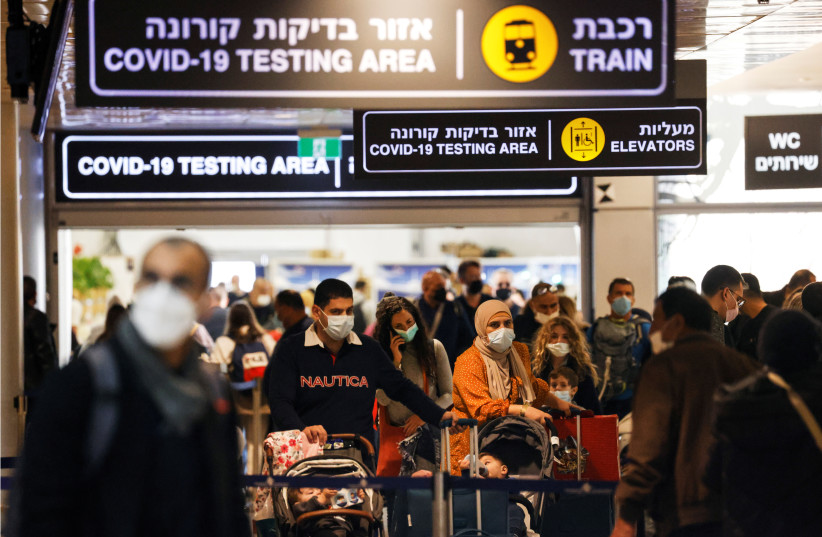With an increase of more than 80% in new COVID cases over the past week and traces of Omicron found in the wastewater of 19 localities throughout Israel, there was no room for doubt on Monday that the new variant had hit the country.
According to the estimates of some experts, including Weizmann Institute of Science computational biologist Prof. Eran Segal, the number of daily cases could increase from the current 1,800 to more than 10,000 within a few days.
Even so, the authorities on Monday were also discussing easing up some of the strictest measures passed to fight Omicron, including the requirement to quarantine for at least seven days after being exposed to the variant, even for fully vaccinated individuals, and some of the travel restrictions.
“It might be counterintuitive, but it is a very well-known phenomenon in epidemiology,” said epidemiologist Nadav Davidovitch, a professor and director of Ben-Gurion University’s School of Public Health and an adviser to the Health Ministry.
“Such decisions are all based on an evaluation of costs versus benefits,” he said. “This wave is very different from the previous ones. With such high infection and reproduction rates, keeping so many individuals isolated helps in a very limited way, while the price is extremely high.”

As of Monday, the reproduction rate, which measures how many individuals each virus carrier infects on average, was over 1.4. But it was expected to reach unprecedented levels of 3 or 4.
If the current policy of requiring people exposed to Omicron to isolate is to be maintained, their numbers could skyrocket from the current 90,000 individuals to hundreds of thousands in the coming days, potentially throwing Israel into chaos, Davidovitch said.
“Because such a large number of people are going to be exposed, we need to change the way we think about prevention,” he said. “Continue to vaccinate, wear masks and so on, but this time, isolating those exposed is not going to be as effective as previous times.”
Something similar is true for travel restrictions, Davidovitch said.
When South African scientists said a new, highly mutated variant was causing a surge in cases in their country at the end of November, Israel immediately closed its borders to all foreigners and required everyone coming back from abroad to quarantine for a minimum of three days, including those who were fully vaccinated. Soon after, it also limited traveling for its own citizens by labeling an increasing number of countries as “red” – where Israelis cannot travel without governmental permission.
“I think it was very important to restrict entry to the country at the time, and it bought us a few weeks to prepare and gather information,” Davidovitch said. “Until a few days ago, a significant rate of Omicron infections came from abroad. But now this is not the case. For this reason, keeping the borders closed, including to non-Israelis, is not relevant any more.”
“The chances of being infected in Israel might be higher than abroad,” he said.
At the same time, Davidovitch stressed that the public should not think easing up these rules is a sign that Israel is entering a free-for-all situation.
Other forms of restrictions might be needed, such as for large gatherings, he said.
“People also need to be careful,” he added. “We are not sure yet that Omicron is less dangerous in terms of serious symptoms. But even if this were the case, there is still a risk that the health system will be overwhelmed. We need to remember that we are also in the flu season.”
A balance between costs and benefits also needs to be found in the education system, Davidovitch said.
“The damage of closing schools and keeping children at home outweighs the benefits that it can bring,” he said. “A school should be closed only if there is an outbreak in it. Children have already suffered too much.”
